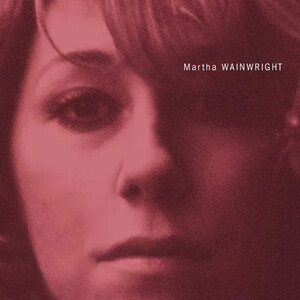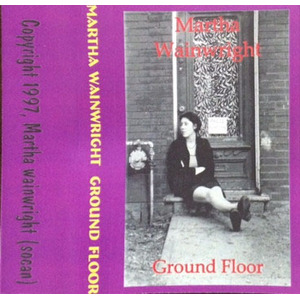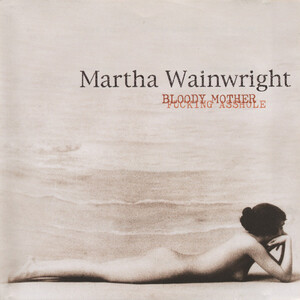Wainwright, Martha
Websites:
https://www.marthawainwright.com/
Origin:
Rhinebeck, New York, USA - Montréal, Québec
Biography:
Martha Wainwright is beginning again.
The beguiling performer and songwriter returns with Love Will Be Reborn. Not since 2012’s Come Home to Mama has a Martha Wainwright record been so full of original written material. Wainwright’s fifth studio album follows recent years of loneliness and clarity in search of optimism and joy.
Wainwright wrote the first song—and what would become the title track— of the record a few years ago. It was a very dark time, she says, but the positivity and luminosity of “Love Will Be Reborn” signalled what was to come. Wainwright was at a friend’s home in London to collaborate on something else entirely when she was struck by the need to write the song. Wainwright demures when songwriting—her process is undisciplined and she prefers to be alone. That day, soon left to that solitude, “Love Will Be Reborn” poured out of her.
“I wrote the song in its entirety within ten or fifteen minutes. I was bawling.” The track feels very English to Wainwright with a soft melody and thrumming guitar, evoking pastoral scenes. Wainwright croons, “There is love in every part of me, I know/ But the key has fallen deep into the snow / When the spring comes I will find it, and unlock my heart to rewind it.” It’s poetic and mysterious, yet still there is a yearning for joy and renewal. Wainwright sang the as-yet recorded “Love Will Be Reborn” on tour, serving as an anthem, giving her hope in a time when it was hard to have some.
Much of Wainwright’s songwriting since 2016’s Goodnight City felt too raw. “There were several years where I picked up the guitar, and I was so, so sad and depressed. I would just put it down because It was terrible.” Before writing it out, or writing through it for catharsis, Wainwright had to live it. Album opener “Middle of the Lake” reinforces Wainwright’s path forward as she sings over voltaic chords and percussion, “I sing my songs of love and pain / Winds of change or simply singing, I'm singing in the rain.” Her work never shies away from an existential throbbing wound. “There are a couple major subjects on the record. From what I can tell, there's really dark and then light,” she says,” It really is reflective of a very difficult period of divorce. Then, after that, it’s meeting somebody new and amazing. And so you hear certain songs about this new love.”
Love Will Be Reborn does have its playful and sensual side running parallel to some grim honesty. “Hole In My Heart” is an upbeat song, with Wainwright singing, “I got naked right away when I saw you / My love was like the rain when I saw you,” as is the track, “Getting Older,” which is about aging. And this new love. Other songs, she says, “represent me trying to shake away the past a little bit, the ball and chain of that anger, trying to escape from it.”
There is no song more gripping than “Report Card.” The song is stripped to essential instrumentals punctuating her anguish. Wainwright expresses on the sombre track a feeling of deep loneliness, evoking emotional nuances particular to parents and individuals separated from their children because of custody arrangements. “I was able to crystallize that sadness by portraying this woman alone in her house.” Wainwright sorrowfully sings, “My heart is always broken and I don’t want you to feel the way i do and “If I seem sad it’s because I am.”
Singing about her children and family is also familiar to Wainwright, a child from such a prestigious musical family. Wainwright has long carried this narrative featuring her famous father, Loudon, her mother, Kate McGarrigle, and her brother, Rufus.
Wainwright’s writing has, of course, evolved as she has grown older and become a mother. She has changed simply by living. While she was, as she says, extremely autobiographical before, her writing has altered to protect her children in some ways. But, and more important, she says, “I can't deny myself the need to express myself. As a songwriter, I have to be able to express myself, and it would be crazy to me to not have songs that are about these two people who I care the most about in the world.”
Back in Montreal, in the basement of her brand new cafe, Ursa, serving as a studio, Wainwright got to work. She enlisted the help of Toronto musicians Thom Gill, Phil Melanson and Josh Cole to perform in her band, and producer Pierre Marchand. His best known collaboration is with Sarah McLachlan, producing some of her iconic 90s songs. Marchand also has a familial connection to Wainwright. Marchand produced her brother Rufus’s second album poses as well as Wainwright’s mother and aunt’s record, Heartbeats Accelerating. It was a record made after sometime, much like Wainwright’s gap since Goodnight City, and McGarrigle was the same age that Wainwright is now. It seems like a musical synergy only the late McGarrigle and Wainwright could have.
Like many records, Love Will Be Reborn was made during a global pandemic. But the process, both freeing and infuriating, offered Wainwright a new way of creating. She let go a little more, giving way for Marchand to play around with vocals, emphasizing the beauty in its inherent scratchiness and edge. This record, Wainwright jokes, is her Canadian record, as she’s back in Montreal, working with musicians from Toronto, and Marchand as producer.
Martha Wainwright's role as an artist has always been to embrace her wildness and sketch out her raw depth. This edge is what makes Wainwright uncompromisingly herself, and continues to draw in an audience two decades on. To begin again does not mean starting over. This process of rebirth honours the past to move forward. Love Will Be Reborn captures Wainwright’s heart in transition. In an effort to rise out of some painful depths, as she says much like a phoenix from the ashes of an existential twilight, Wainwright bore witness to what her heart endured to find a new joy once more.
Martha Wainwright Tells a Few Stories She Might Regret
With a new memoir, the singer-songwriter from a famous musical family says she is happy to be “letting go of this story of being No. 4 on the totem pole.”
By Emily Gould
May 12, 2022
When Martha Wainwright was 14 years old, she moved to New York from her home in Montreal to live with her father, the singer-songwriter Loudon Wainwright III. Her mother, the Canadian folk star Kate McGarrigle, was busy with a new album and a concert tour, and so it was decided that Loudon would watch over Martha for a year. The New York experiment turned out to be something of a failure, though, according to Ms. Wainwright; she did poorly in school and stayed out late, as if in competition with a father who was sometimes out even later. But the year definitely had its upsides: “I became more like my father, as if the DNA in me that came from him started to wake up,” she writes in a new memoir, “Stories I Might Regret Telling You.”
A few years later she went with him on a tour of Britain, serving as his warm-up act and joining him onstage for father-daughter duets. One night she heard him introducing “I’d Rather Be Lonely,” a song she had figured was about an old girlfriend. So she was surprised when he told the audience it was about the year he had spent living with his teenage daughter. As Ms. Wainwright listened to him sing the key lines — “You’re still living here with me / I’d rather be lonely” — she began to cry.
“A part of me wanted to jump to my death from my tiny seat,” Ms. Wainwright, 46, writes in the memoir. “Or, better yet, take off into the night, leaving him standing there waiting for me. But the show must go on, so I dried my tears and went down the stairs and on to the stage.”
Confessional art always comes at a cost, for its creators and subjects alike, as people in the Wainwright-McGarrigle family know all too well. Loudon, who rose to sudden success with the novelty hit “Dead Skunk,” has included songs about his family on a majority of his more than 25 albums, many of them devastatingly personal. Ms. McGarrigle, who made 10 albums as part of a duo with her sister Anna before her death in 2010, also wrote a number of autobiographical songs that touched on her marriage to Loudon, which ended in divorce, and their children.
When Martha and her older brother, the singer-songwriter Rufus Wainwright, came of age, they joined what was by then an established family tradition. The first song Ms. Wainwright wrote was about the birth of a new half sibling, a wry welcome to her singular family; and a song on her brother’s 1998 debut album delved into his relationship with his mother.
As children, Martha and Rufus sang for paying audiences at folk festivals. Later, when he had a deal with the DreamWorks record label and started touring the world, she was often his backup singer, an arrangement that eventually came to an end. “He needed to cut the fat and I needed to get out of his shadow,” she writes.
In New York, Ms. Wainwright performed in dive bars while putting herself through a series of crushes on unavailable men. She was by turns ambitious and self-destructive. On nights when she knew a label scout or producer was in the crowd, she would go onstage drunk or high. “I created an impossible situation for myself,” she writes. “I was afraid to fail but I kept setting myself up to fail.”
As her brother’s fame grew, she struggled with her status as the least famous member of her nuclear family. And while her parents provided inspiration, she says in the book that they could have been more helpful. “I don’t know if you’re wondering where my dad was during those New York years,” she writes, “but at the time, I was wondering, too.”
For a while Rufus was running around as part of a “sons of” club, a group that included Sean Lennon, Chris Stills and Harper Simon. “They were all getting signed and written about and had publicists and photo shoots and beautiful girlfriends,” Ms. Wainwright says in the memoir. “Were their songs better than mine?” The chip on her shoulder led her to write a grand statement song, its title a vulgar epithet. Contrary to what she has told journalists in the past, the song isn’t about her father — or, rather, it isn’t exclusively about him.
In addition to the attention-grabbing title, the song had perhaps the closest thing to a pop hook to be found in her oeuvre up till then. Whereas the typical Martha Wainwright melody meanders as it showcases her acrobatic whisper-to-scream vocal range, this one was different: a folky strum-and-shout with straightforward lines like “Oh, I wish, I wish, I wish I was born a man.”
The Guardian called the song a “masterpiece” when it appeared in 2005 as the centerpiece of “Martha Wainwright,” her first album. Critics admired her debut but couldn’t resist comparing her with the rest of her family. A Pitchfork reviewer praised her voice and her songs, only to add the caveat that her ability to write about personal matters with such candor “would be more remarkable if it weren’t a genetic trait.”
Her next album, “I Know You’re Married but I’ve Got Feelings Too,” was partly produced by Brad Albetta, a bass player who, by the time of its 2008 release, was also her husband. Their relationship had always been tumultuous, but she had pushed for marriage anyway, partly because she wanted to “grow up” before losing her mother, who had been diagnosed with terminal cancer.
Her memoir goes deep into her mother’s illness and death, which coincided with the premature birth of Ms. Wainwright’s first child. In less capable hands, such material could come across as maudlin, but Ms. Wainwright has a light touch and an eye for telling detail. She describes wanting to put her mother’s cancer-ridden body in the same kind of incubator that was keeping her son alive, as well as the moment when she and Ms. McGarrigle compared their damaged bodies — her own fresh C-section incision, the chevron scar from chemo that covered her mother’s torso.
Ms. Wainwright’s marriage limped along after her mother’s death. She clung to Mr. Albetta as a source of stability (not to mention bass playing). “I really like the makeup sex / It’s the only kind I ever get,” she sang from the stage while on tour for the album “Come Home to Mama,” with her husband close behind onstage.
An early draft of “Stories I Might Regret Telling You” that contained more details about those years was used as an exhibit in their divorce proceedings in 2018. That version — “the whole enchilada,” as Ms. Wainwright described it in an interview — was pared down considerably before publication.
Rather than zeroing in on the father of her children (a second son was born in 2014), Ms. Wainwright concludes the memoir by focusing on her creative and personal renaissance of recent years. She describes the aftermath of a show she gave in Los Angeles, when she emerged rumpled from the house of “someone everyone in the world wants to sleep with” full of joie de vivre and “glad to know that rock ’n’ roll was still alive and I was still a part of it.”
On a recent Zoom call, she looked and sounded exactly as she does onstage: beautifully unvarnished, full of open-mouthed laughter. In the past few weeks she has been preparing to go on tour with a show that combines readings from the memoir and performances of songs on her latest album, “Love Will Be Reborn.” She said a documentary filmmaker has been following her around, adding that she sometimes wished she had a larger-than-life persona to hide behind, like Tom Waits’s or Laurie Anderson’s.
Lately, she added, she has been in the mood to do some serious spring cleaning in her building in Montreal, which she inherited from her mother. “There’s a back room that’s filled with the Kate McGarrigle and Anna McGarrigle archive and crap,” she said, gesturing toward a door behind her desk. “I feel like I’m almost about to light the whole thing on fire. I’m not going to do it literally, but I’m like, ‘OK, let’s call a museum and have them take it away.’ And I think that I’m kind of excited about it. And maybe I’m excited about letting go of this story of being No. 4 on the totem pole.”
She said that when she thinks about her earlier albums, filled with so many songs referring to her marriage, she wonders whether she had created the situation in order to mine it for material. Now she’s in a relationship that inspires lyrics like “I got naked right away when I saw you / And my love was like the rain when I saw you.”
If her contentment threatens her creative output, she’s fine with that. “I’ll keep the love and forgo the material, if need be,” she said.
But later in our conversation, she revised that assessment, after mentioning her plan to pick up her guitar later in the day and try to write some new songs: “I haven’t in a while, so I’ll see if I’m too happy and I made a terrible mistake.”
Even her relationship with her father seems in a good place. “Stories I Might Regret Telling You” begins with the story of her own birth, or, rather, the story of how she almost wasn’t born. Her father, she writes, tried to persuade her mother to have an abortion when she was pregnant with her, which is something he confessed to Ms. Wainwright when she was a teenager. “It hurt my feelings,” she writes with an understatement that makes the story sort of hilarious. “I had always felt a little out of place in the world, and knowing that I’d only just barely made the cut didn’t help matters any.”
Three days before our interview, her father called her to say he loved the book.
“I mean, his voice was a little tight when he said it,” Ms. Wainwright said. “He told me he didn’t see things exactly the same way, and I asked him if he could accept my version, and he said that he could accept it. And so that was a really nice moment for us.”





